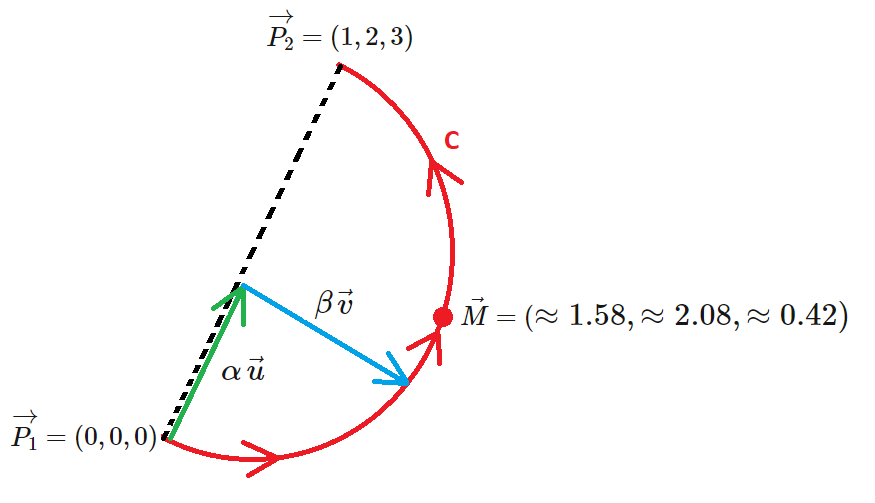Vector Field / Line Integral (Part 2)
The vector field F has components ( F x , F y , F z ) = ( x y , y z , z x ) . Consider the integration path C , which is a semicircle starting at P 1 = ( 0 , 0 , 0 ) and ending at P 2 = ( 1 , 2 , 3 ) (see "details" section). The diameter of the semicircle is D , and its radius is R .
P = P 1 + α u + β v ( R − α ) 2 + β 2 = R 2 0 ≤ α ≤ D
What is the value of the line integral of the vector field over the path?
∫ C F ⋅ d ℓ
Details and Assumptions:
1)
Vector
u
is a unit-vector in the direction of
(
1
,
2
,
3
)
2)
Vector
v
is a unit-vector in the direction of
(
1
,
1
,
−
1
)
3)
The middle point of the curve is
M
=
(
≈
1
.
5
8
,
≈
2
.
0
8
,
≈
0
.
4
2
)
. Use the positive root for
β

The answer is 4.202.
This section requires Javascript.
You are seeing this because something didn't load right. We suggest you, (a) try
refreshing the page, (b) enabling javascript if it is disabled on your browser and,
finally, (c)
loading the
non-javascript version of this page
. We're sorry about the hassle.
The center of the semicircle is at 2 1 ( { 0 , 0 , 0 } + { 1 , 2 , 3 } ) or { 2 1 , 1 , 2 3 } .
The normalized u vector from the center to the start is { − 1 4 1 , − 7 2 , − 1 4 3 } .
The normalized v vector is { 3 1 , 3 1 , − 3 1 } .
p ( θ ) is { 6 7 sin ( θ ) − 2 cos ( θ ) + 2 1 , 6 7 sin ( θ ) − cos ( θ ) + 1 , − 6 7 sin ( θ ) − 2 1 3 cos ( θ ) + 2 3 } .
∂ θ ∂ p ( θ ) is { 2 sin ( θ ) + 6 7 cos ( θ ) , sin ( θ ) + 6 7 cos ( θ ) , 2 3 sin ( θ ) − 6 7 cos ( θ ) } .
f ( x , y , z ) is { x y , y z , x z } .
The expression to be integrated, f ( p ( θ ) ⋅ ∂ θ ∂ p ( θ ) expands and simplifies to 7 2 1 sin 2 ( 2 θ ) ( − 3 4 4 2 cos ( 2 θ ) + 5 8 4 2 cos ( θ ) + 6 sin ( θ ) ( 1 3 − 9 7 cos ( θ ) ) + 3 2 4 2 ) .
The indefinite integral is 8 6 4 1 ( 1 8 4 2 θ − 1 8 9 4 2 sin ( 2 θ ) + 2 5 8 4 2 sin ( θ ) + 3 4 4 2 sin ( 3 θ ) − 1 3 4 1 cos ( θ ) + 9 9 0 cos ( 2 θ ) − 2 9 1 cos ( 3 θ ) ) .
The result is 8 1 π 6 7 + 9 3 4 or about 4.20194126461.